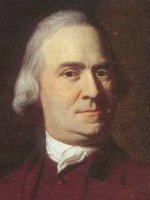Samuel Adams on Samuel Adams
Yesterday I mentioned James Spear Loring’s Hundred Boston Orators, an oft-reprinted collection of profiles of prominent Bostonians from the late eighteenth and early nineteenth centuries. As his biographical subjects Loring chose the men who delivered public orations in Boston on the anniversary of the Massacre, Fourth of July, and other notable dates.
Gov. Samuel Adams never actually delivered such an oration. He wasn’t a powerful public speaker, preferring to make his arguments in print and to organize political strategy. But that Adams was so important that Loring had to discuss him along with the orators.
In that discussion, Loring interviewed the younger Samuel Adams, the wire-worker known for speaking at town meetings in the early 1800s and for being old enough to have lived through the Revolution. The resulting passage said:
TOMORROW: So what did Samuel “Rat-trap” Adams do in the Revolution?
Gov. Samuel Adams never actually delivered such an oration. He wasn’t a powerful public speaker, preferring to make his arguments in print and to organize political strategy. But that Adams was so important that Loring had to discuss him along with the orators.
In that discussion, Loring interviewed the younger Samuel Adams, the wire-worker known for speaking at town meetings in the early 1800s and for being old enough to have lived through the Revolution. The resulting passage said:
Samuel Adams was emphatically the man of the people; and the editor, who has had conversation with his namesake, the ancient towncrier, now ninety-two years of age and with clear memory, was informed that Adams once remarked to him,—“We, the people, are like hens laying eggs; when they hatch, you must take care of the chickens. You are a young man, Samuel, and as you grow old, you must abide by our proceedings.”Those quotations, especially the second, seem to reflect the younger Adams’s democratic politics. But they also seem characteristic of the older Adams. John C. Miller quoted the second quotation in his 1936 biography while the wire-worker’s remark about Adams and Hancock became “a popular saying” in S. A. Drake’s Our Colonial Homes (1894).
At another time, our political patriarch observed to him,—“It is often stated that I am at the head of the Revolution, whereas a few of us merely lead the way as the people follow, and we can go no further than we are backed up by them; for, if we attempt to advance any further, we make no progress, and may lose our labor in defeat.”
Samuel Adams was ever at the head of Boston deputations before the Revolution, and conducted the correspondence with patriots in remote places; or, to adopt the language of the venerable town-crier, “Samuel Adams did the writing, and John Hancock paid the postage.”
TOMORROW: So what did Samuel “Rat-trap” Adams do in the Revolution?


No comments:
Post a Comment